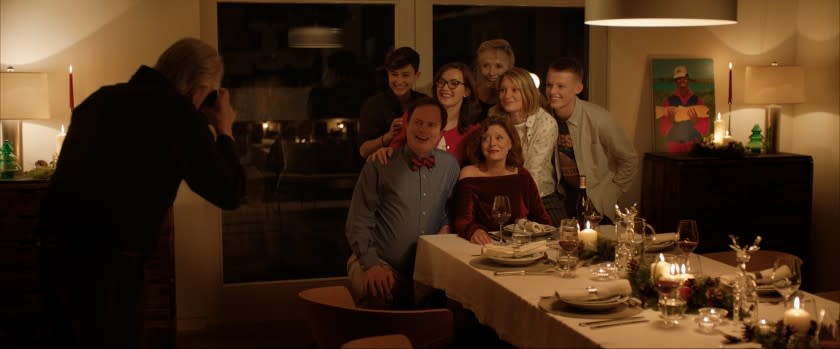Review: Love, life and death in the intimate family drama 'Blackbird'

The Times is committed to reviewing theatrical film releases during the COVID-19 pandemic. Because moviegoing carries risks during this time, we remind readers to follow health and safety guidelines as outlined by the Centers for Disease Control and Prevention and local health officials.
“You just show up and give life your best shot.” That’s the only pearl of wisdom that Lily (Susan Sarandon) wants to impart to her grandson, Jonathan (Anson Boon), along with stressing the importance of hand-written thank you cards and punctuality. What other advice is there, really, when steeling oneself for the imminent end of your life? Questions about life and how to do it right, or at least well, wrestle at the center of Roger Michell’s “Blackbird,” an exceedingly tender and intelligent film about the beauty and grace to be found in death.
“Blackbird” is a remake of the 2014 Danish film “Silent Heart,” and that film’s screenwriter, Christian Torpe, has written the screenplay for this version as well. Lily is the matriarch of a close-knit family gathered at her seaside home for what she and her husband, Paul (Sam Neill), have decided is her final weekend. She suffers from an unnamed degenerative terminal illness (like ALS) and has decided to peacefully end her life, before her condition deteriorates further, at the end of cozy and contented time with family.
But as anyone who has ever gathered with family knows, rarely are such events contented, especially when the stakes are this high. Though all Lily wants is to drift away on a chemical cloud of good love, good food, good wine, and good drugs, combining siblings and in-laws and old friends in one house can be volatile, especially with the ticking clock of Lily’s suicide drawing closer.
The wild card proves to be Anna (Mia Wasikowska), Lily’s flighty and fragile younger daughter, who instantly clashes with her uptight, fretful older sister Jennifer (Kate Winslet). While the family strives to create the perfect weekend for Lily, complete with Christmas dinner, the truth must always come out, and Lily’s death adds a layer of urgency to every secret.
Michell, known for “Notting Hill,” “Morning Glory” and, most recently, “My Cousin Rachel,” among many others, is a skilled and versatile director, able to genre jump while always putting character first. He’s a sort of master at dinner scenes, and the one that anchors “Blackbird” is breathtaking. Lily, bathed in candlelight, swathed in red velvet, is the radiant focal point of this meal that runs a full emotional spectrum as revelations surface. Cinematographer Mike Eley, a frequent Michell collaborator, captures close-ups with a light-touch hand-held camera, utilizing focus to layer characters as they navigate the tricky waters of the truth. The entire film is beautifully shot, utilizing practical lighting and the gorgeous natural setting efficiently.
Intimate moments, both delicate and bruising, are captured with an honesty and plausibility that prevents the film from ever becoming too treacly or maudlin, with a cooler tone that trends toward the logical and the existential, rather than the sentimental. That allows Lily to use aphorisms that border on cliché, like, “love is all there is,” which feels different when declared in the middle of a family feud hours before her assisted suicide.
The core truth at the center of “Blackbird” is Lily’s agency in all of this, every choice her own. Sarandon is perfect in her embodiment of this fierce yet vulnerable woman whose spirit never wavers, even as her body does. She’s supported by the performances around her, including Lindsay Duncan, as her lifelong best friend, who gets one powerful monologue, as is required by law (or should be), while Neill’s presence bathes the atmosphere with an aura of calm decency. “Blackbird” is a simple tale, well-told, but it’s also the tale of all tales, of life, death and everything in between.
Katie Walsh is a Tribune News Service film critic.

